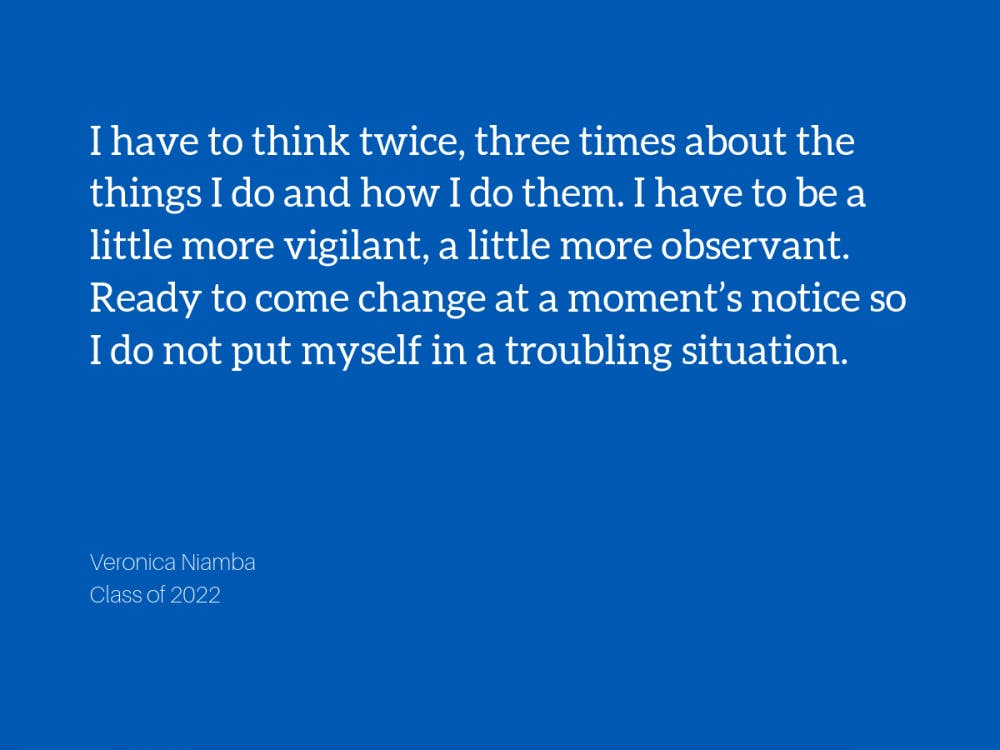Traveling as a black woman is a unique experience. I recently visited a country that was a lot whiter than the United States and whose black population was less than one percent. I was surrounded almost exclusively by white people. I noticed them and they noticed me. They really noticed me. Everywhere I went I was being looked at, stared at. People were x-raying me with their eyes on the subway, on the street, on the bus, in restaurants, in stores. Everywhere I went I was followed by an unfamiliar gaze. I stood out. I was hypervisible. And it didn’t feel good. I felt like a test subject in a lab. Like a show being watched. Like I was a new species that they were discovering.
Back home in the United States I am also hypervisible, but in a different way. I usually don’t elicit stares because someone hasn’t seen or interacted with black people before. I always feel seen and watched though. Every move I make feels critiqued and scrutinized. If I speak too loud or get too angry, I am branded the ‘angry black woman’. My natural hair or protective styles are often deemed unprofessional. My resting face is seen as a threat. I strike fear in the hearts of middle aged white women clutching their bags everytime I enter within a thirty foot radius of them.
Because of my hypervisibility I have to take precautions that other people don’t. I became aware that I would need to move around differently in the sixth grade. I was going to the local grocery store after school with some of my friends. We were hungry and wanted to get the 59 cent dollars the store offered. It being after school, we all had our backpacks on. The four of us walked in and began heading to the pastry section when a security guard told me I had to leave my bag at the front. My friends asked if they had to give their bags too. “No just her” the guard said. There was no fear of theft from the non-black kids in my group. It was only meant for me, the small black girl whose backpack was so full she couldn’t have stolen anything if she wanted to. I told my friends I was just going to head home, that I wasn’t that hungry anymore.
I left the store. I thought about my experience the whole walk home, but didn’t tell my mom until two years ago when I walked into Harris Teeter during the first couple weeks of school at Duke, with my backpack on and heart beating out of my chest for fear that I would be told to turn around, or leave my backpack with a guard. No one told me anything and I did my shopping with friends, but not without the constant fear that I would be reprimanded. From now on, I walk in the middle aisles of stores away from the products on the shelves, I keep my hands away from my pockets, I walk slowly, as to not have someone believe I am stealing for the sole reason that I am black. Let’s not even get started about the panic that rushes through my body when I see a police officer.
At the same time, even when a blinding light is being shone on every part of my existence, I feel invisible and unseen. My words aren’t afforded the same weight as those of my white counterparts. An idea isn’t deemed interesting if it comes out of my mouth, but let it be another person and you’d think they found out the key to traveling at the speed of light. People don’t ask for my opinions. They assume them, or assume I have none. I am oftentimes the last person in a group to be addressed. I don’t feel like I belong. People expect me to move out of the way for them, when we’re on a crowded sidewalk. My hypervisibility and invisibility are not only physical, but mental and emotional.
It is not possible for me to solely exist. Everywhere I go I am both ignored and overly acknowledged. I have to think twice, three times about the things I do and how I do them. I have to be a little more vigilant, a little more observant. Ready to change at a moment’s notice so I do not put myself in a troubling situation. The light of the sun shines on me, but the shadows it creates hide me, and through that I have to find a way to exist, to keep being me, and to not change who I am on the inside.
Veronica Niamba is a Trinity junior. Her column, "not another subtweet,” runs on alternate Mondays.
Get The Chronicle straight to your inbox
Signup for our weekly newsletter. Cancel at any time.

